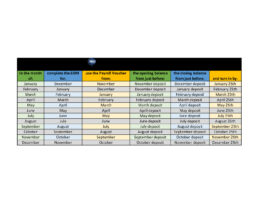FBMI Updates
Friday Financial Tip #34: Receiving Money from Third-Party Money Apps
What Happens When I Get Money Directly into My FBMI Account?
Recently, I have had discussions with a couple of missionaries in regards to getting money from third-party money apps directly into their FBMI work-fund accounts. In both cases, I had to remind the missionaries that monies received in this manner are not considered donations to FBMI. The donors of these funds cannot receive a charitable contribution statement from FBMI because the funds were not given to FBMI, a 501C3 non-profit organization. The funds were given directly to them as individuals.
Last year, First Financial Bank made access to Zelle very easy. I initiated the app myself. However, I soon came to realize how easy it would be to think getting money in this manner would constitute a donation to FBMI. That is not the case.
Also, remember that any ministry funds you receive that do not go through the FBMI office can generally be considered Support & Love Offerings Given Directly to You and should be entered into Box C on the EOM.
Missionary Evangelist James Belisle
FBMI Field Service Coordinator
Western Hemisphere
Friday Financial Tip #33: Printing of Prayer Letters
We are so glad to be able to serve Him with you. We are glad to be able to offer many services related to prayer letters and other updates through our FBMI office. Most of you are very familiar with our free emailing service, which includes proofreading, posting, and sending each update to all of your subscribers. This service is a great way to send your update to hundreds or thousands of subscribers at no cost to you.
In addition, many of you use our Prayer Letter Services, which is a paid service allowing you to send physical, mailed prayer letters. This service is provided through a partnership with FBMI and Grace to Grow Publications. Because of rising overhead and equipment costs, the charges from Grace to Grow are increasing by 20%. For a black-and-white, one-page letter printed on existing full-color letterhead and envelope, the updated cost for printing, folding, inserting, sealing, and mailing one letter is $1.41. This price includes the 73-cent stamp as well.
This price increase will take effect on March 1. If you have any questions or would like more details, please feel free to reach out to us.
Thank you for your time and for your faithful service. Have a great day in our Lord Jesus Christ!
Friday Financial Tip #32: Life Insurance
FBMI strongly encourages all of our missionaries to have adequate life insurance.
Many of today’s financial advisors would tell you that you should have enough life insurance to pay ten years’ worth of expenses. Note that this is not the same as ten years’ worth of income.
Friday Financial Tip #30: 2025 EOM Form
Dear Friend,
We are so glad to be able to serve with you. We pray that God will bring blessings to each and every one of you throughout this new year. We are excited to announce that we now have the new 2025 EOM form available for download from the FBMI website. You will begin using this new form in February as you report on January. If you still need the EOM form for last year, you can download it here.
On another exciting note, some of our missionaries are beginning to use our online EOM. This form will be updated after January 25 to be used seamlessly in February. You may begin using this form anytime as an alternative to the Excel spreadsheet. After completion, you will receive a PDF form that is also automatically sent to our office. If you have any questions about either form, please contact your FSC or Joe Palmer.
Thank you for everything you do for our Lord Jesus Christ. You all are in our prayers, and we are happy to see the work that God is doing through you.
May God bless you all!
2025 EOM Report Form
Select the link below to download the correct 2025 EOM form.
Missionaries still on deputation should not use Box E in the form because they do not yet have a fixed salary. Please complete and email this form to finance@fbmi.org. Direct any questions you have to your Field Service Coordinator (FSC) or call FBMI at 219.228.2850.
Friday Financial Tip #29: Homeschooling
Dear Friend,
If you would like to educate your children with the A.C.E. program, Operation Lighthouse (OPL) is a nonprofit outreach for U.S.-based missionaries serving in a foreign country. OPL assists missionaries with A.C.E. curriculum (PACEs) and offers a substantial discount to enroll in Lighthouse Christian Academy’s accredited program.
If you or someone you know needs a Christian curriculum and program with a full-service, distance-educational school, please contact Accelerated Christian Education by email at LCAed@acem.org or by phone toll-free at 1-866-746-6534 for more information on how to qualify.
Thank you!

Friday Financial Tip #28: Medical Reimbursements
What happens if I have a medical reimbursement?
Many missionaries enjoy the benefit of being involved in the Health Care Sharing Ministry provided by First Baptist Church. As part of this ministry, a missionary may be reimbursed for medical expenses he initially paid. If this reimbursement comes through the FBMI business account, a missionary must be careful to handle this money correctly to avoid paying taxes on this amount. Please keep the following things in mind for a medical reimbursement paid to your FBMI business account:
1. Do not add the amount of a medical reimbursement anywhere on the End of Month Report (EOM).
2. Withdraw or transfer the amount of the medical reimbursement from your business account the same month in which the reimbursement was received. (You should withdraw at least that much above your personal salary and other withdrawals to ensure there are no tax implications.)
If you have any questions about the Health Care Sharing Ministry and your benefits, please feel to reach out to our office or to contact Laura Goodall at First Baptist Church (laura.goodall@fbchammond.com).
Friday Financial Tip #27: Proofreading
We are grateful for Mrs. Kim Marsack and her love for missions and for missionaries. We are especially appreciative of her hard work in proofreading our missionary prayer letters each month.
Although Mrs. Marsack is both skilled and eager to help in the many aspects of proofreading and minor editing, she is neither able nor expected to design a missionary’s prayer letter. Please be conscious of this as you work to prepare your letter. If you send her your prayer letter as plain text to be proofread, plan to design the prayer letter document yourself before sending it back to her for final approval. This would include the placement of any pictures or other graphic elements. Any pictures to be included in your document should be chosen and placed by you. You should never send a group of pictures unless they are simply to be added to your online post. Of course, you may also include a link in your document to an online picture folder, if desired.
If you send her an already designed prayer-letter document, the proofreading adjustments may affect the visual design of the letter inadvertently. You should always plan to reevaluate the look of the prayer letter before you give the final approval.
Please reach out to Joe Palmer or our office at contact@fbmi.org for any related questions about the proofreading process.
Thank you for your time! Have a great day!
Friday Financial Tip #26: Christmas Updates
Dear Friend,
Thank you for your love for Jesus and your service for Him!
As Christmas nears, many of you are beginning to think about mailing a special Christmas prayer letter. Please plan to submit these letters no later than November 30 this year to ensure that there is enough time before Christmas for them to be:
- Proofread by Mrs. Kim Marsack.
- Posted and emailed through fbmi.org.
- Processed and printed through Grace to Grow Publications.
- Folded and mailed by our Prayer Letter Services.
- Received by your supporters, friends, and family.



